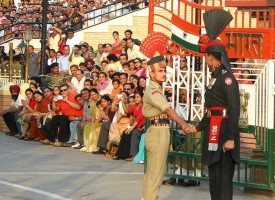Time and again, the Indian establishment creates a stir in the media by pressing Pakistan on the extradition of Zakiur Rehman Lakhvi, Hafiz Saeed and other members of Jamaat-ud-Daawa (JuD) who it believes are responsible for the tragic 26/11 Mumbai attacks. Without an iota of tangible evidence to support its claim, India further alleges that Pakistan’s premier spy agency, Inter-Services Intelligence (ISI) provided finance and logistical support to JuD members.
JuD is a Pakistani religious and welfare organization which operates independently. They have been open and vocal on the rights of Kashmiris in Indian-Occupied Kashmir (IOK) and have even provided support to resistance movements championing the cause of the oppressed. JuD has never tried to hide this fact. If we are to believe India’s claims purely for the sake of argument, JuD is a non-state actor as an entity and does not receive state support.
On the other hand, I will present a fact-filled dossier on behalf of myself and other ordinary citizens of Pakistan on Indian Army’s terrorism on Pakistanis. Yes, you read that right. The dossier below is not going to discuss lesser-known Indian groups or supported organizations. It will only discuss the role of Indian Army as an institution and its uniformed personnel in fomenting terrorism on Pakistanis.
The Indian Army is known to stay away from national politics and has adopted a long-held policy of non-interference in the country’s political affairs; or so we are told. We have long been told of how the Indian Army has never staged a coup and always supported the process of democracy and secularism. The examples below will lay bare these deceitful claims quoting sources from within India’s mainstream media. We, the Citizens of Pakistan, will not quote any Pakistani or Western source, absolutely not. We are going to rely solely on India’s own media sources to add weightage to our claims.
Samjhauta Express bombing
These horrendous attacks on a ‘friendship’ train travelling from Delhi, India to Lahore, Pakistan occurred on February 18, 2007, at around midnight. Two carriages in the train, loaded with hundreds of passengers, were bombed as soon as it passed Panipat city to Delhi’s north. 68 (sixty eight) passengers, most of them Pakistanis, were killed in this bombing; carriages were engulfed in balls of fire. Some of the victims also included Indian civilians and railway policemen.
Investigations revealed that explosives (RDX) and bombs were used to execute the attack. Eight carriages, which were unaffected, continued to Lahore while the souls of terrorized victims languished behind. Without any evidence to support their claims, India’s ruling party Bharatiya Janata Party (BJP), then in the opposition, held Pakistan responsible for attacking its own citizens; certainly a preposterous assertion
By the end of October 2007, members of the Indo-Pak Anti-Terror Mechanism (ATM) group kept meeting to apprise each other on the status of the investigation. It was in November 2008 that Indian media started reporting of a certain ‘Prasad Srikant Purohit’ who was a key figure in plotting the Samjhauta Train bombing. Later, it surfaced that Purohit is a serving Lieutenant Colonel in Indian Army’s Military Intelligence and, simultaneously, a member of the radical Hindu militant outfit Abhinav Bharat (Young India). In an interview, he boldly admitted that whatever activities he engaged in by infiltrating Abhinav Bharat, he kept his army bosses “in the loop” and that a record of all his activities “is on paper in the army records”.
The Samjhauta Express bombing was Purohit’s first false-flag attack orchestrated on the request of Indian Military Intelligence (MI). Later, he was also found involved in the 2008 Malegaon blasts on India’s own home soil against Muslims.
It is interesting to note that during the Malegaon blast’s investigation, Purohit was taking an 18-month course in Arabic language at the Indian Army Education Corps’ Training College and Centre at Panchmarhi in Madhya Pradesh. He was given a go-ahead for this course by his Commanding Officer Brigadier Sandeep Kumar at MI’s Liaison Unit in Army’s Southern Command based in Pune.
The issue of Samjhauta Express bombing was not given the serious attention it deserved from Pakistani and Indian governments. Our own governments (Musharraf regime, PPP’s rule and PML-N’s current tenure) threw the issue on the backburner, exhibiting insensitivity and inexcusable criminal negligence.
On June 30, 2014, Purohit wrote a letter to Indian Prime Minister Narendra Modi and Home Minister Rajnath Singh alleging that Maharashtra’s Anti-Terrorism Squad (ATS) had “fabricated” charges against him. Almost a year later, it seems Modi’s soft corner for radical Hindutva (Hindu terror) organizations gave way as signs are emerging of Purohit being released on bail anytime soon. Bear in mind that several Hindutva leaders such as Swami Aseemananad and Sadhvi Pragya Singh Thakur were also found complicit in the attacks but the focus of our dossier is purely on Indian Army officers (serving in uniform).
Several high-profile investigations have suggested a nexus between Indian Army’s MI and Hindutva outfits. Former IG Maharashtra Police S.M. Mushrif wrote in great detail in his book ‘Who Killed Karkake? The Real Face of Terrorism in India’ that the ATS chief (Hemant Karkare) had uncovered a large, secret nexus between extremist Hindu militant outfits and Indian military/intelligence forces. He was instrumental in probing their links that he was conspicuously target-killed in the middle of the 26/11 attacks when bullets were fired to his chest. S.M. Mushrif hints at a conspiracy by Indian state elements to silence Karkake because it would expose how the secular order in India was being silently overturned by India’s hardcore Hindu right-wing establishment in connivance with the ostensibly secular military.
A petition filed in 2012 in the Supreme Court of India also records an incident dated November 2008 saying: “The involvement of Lt Col Prasad Purohit in the Samjhauta Express blast was disclosed during his narco analysis test conducted by Maharashtra ATS Chief Hemant Karkake in connection with the Malegaon blast case 2008, but the I.B. (Intelligence Bureau) allegedly pressurized Hemant Karkake through the Central Government not to pursue this line saying, “This would impair the Centre’s credibility internationally, as when the train blast (Samjhauta Express) took place, the Centre had blamed Pakistan’s ISI for the terror strike on the basis of I.B.’s (baseless) insinuations”.”
More incriminating is a report published in March 2013 based on a Right To Information (RTI) query which shows Purohit continues receiving full salary, perks and allowances from the Indian Army even in jail!
Attack on ISI’s Faisalabad office and other terrorist activities
After the 26/11 Mumbai attacks, Indian Army chief General VK Singh setup a clandestine unit in the Military Intelligence called “Technical Support Division” (TSD) with the purported aim of countering ‘Pakistani terror groups’. It had the complete endorsement of India’s Defence Minister Arackaparambil Kurien (A.K.) Antony, National Security Adviser Mayankote Kelath (M.K.) Narayanan and other senior government officials.
The unit was headed by various Indian MI officers (functioning from April 2010 to May 2012) and was reportedly disbanded after a high-level inquiry was initiated by then Indian Army chief General Bikram Singh via his DG MO Lt Gen Vinod Bhatia. The reason Bikram Singh was so keen on ascertaining TSD’s activities was because it had once harmed his own operations when he was serving in occupied Jammu & Kashmir. Furthermore, TSD officers had been tasked by Bikram Singh’s predecessor, VK Singh to lodge fake FIRs against him so he could not become the army chief. These attempts failed, as we now understand.
It was revealed that TSD gained momentum during the army headship of VK Singh and his right-hand man, then DG MI Lt Gen Rakesh Kumar (RK) Loomba. In fact, it was Loomba who had proposed TSD’s establishment to VK Singh. Both encouraged TSD personnel to carry out counter-intelligence, covert operations and surveillance inside Pakistan and Kashmir. Besides external activities, TSD was found involved in wiretapping its own government officials in New Delhi, which proved a major embarrassment for the military high-command.
TSD was headed by Colonel Munishwar Nath Bakshi, known as “Hunny Bakshi” in the Indian Army. Bakshi has been serving Indian Army for 26 years and is among a few officers who directly joined the army’s Military Intelligence Directorate (MI Dte) after he graduated from the Indian Military Academy; in the past, he had operated extensively in occupied Jammu & Kashmir. A detailed report by Indian journalist Ajit K. Dubey reveals the following:
• Bakshi’s first recruit for TSD operative was Lt Col Vinay B. alias “Birdie”, who previously served in India’s external spy intelligence, the Research & Analysis Wing (RAW).
• His second recruit was Lt Col Sarvesh D, a veteran skydiver who commanded an Army company during the Kargil war; later, he was part of the Special Action Group of the National Security Guard.
• The third recruit was Lt Col Alfred B, a seasoned negotiator. During his previous service with 28 Assam Rifles, he had created intelligence assets for espionage in United Liberation Front of Assam (ULFA) ranks.
• The fourth recruit was Lt Col Zir, who had considerable experience in India’s troubled north-east corridor (rife with home-grown insurgency). Zir was a specialist in gathering leads on purported arms shipments from Myanmar into India and helped intercept consignments.
• Bakshi’s most important pick was Lt Col Anurag alias “Naughty”. Though overweight and diabetic, he was crucial in identifying stone-pelting Kashmiri targets for the Indian Army who were resisting the military’s terrorism in occupied territories in 2010.
Dubey says a Board of Officers’ Report which investigated TSD’s operations mentioned the unit had carried out several attacks inside Pakistan, especially the bombing of an ISI office in Faisalabad in 2011. The report says TSD had bombed the compound.
It is very interesting to note that on March 8, 2011, a report in DAWN quoted Tehreek-e-Taliban Pakistan (TTP) spokesperson Ehsanullah Ehsan ‘claiming responsibility’ for the attack. Initially considered a suicide attack, it was established as a planted bomb attack. Regional Police Officer (RPO Aftab Cheema) had said the explosive was planted in a car.
In light of investigative reports on TSD, the question now arises: Why did the TTP claim responsibility for an attack that was masterminded by Indian MI’s TSD? Is India’s MI using TTP as a field asset? This link is highly damning indeed!
After TSD’s cover was blown and it was disbanded by Bikram Singh, the unit’s top operatives dispersed, most fearing for their lives and that of their families. Their recently-reported current military assignments are as follows:
• Colonel Munishwar Nath “Hunny” Bakshi is nowadays with a unit in Ladakh near the Indo-China border where his job is to count snow jackets and shoes in the winter stock. The blatant expose of TSD by Indian media disillusioned him so severely that he had to undergo psychiatric treatment in a Delhi hospital; his wife told the Ministry of Defence he has developed “suicidal tendencies”.
• Lt Col Vinay B. alias “Birdie” is presently with Military Engineering Services in Shillong where he supervises plumbers and masons who maintain official quarters of Air Force officers.
• Lt Col Sarvesh D, the skydiver, maintains land records of a small formation in Jharkhand.
• Lt Col Alfred B. is serving as a National Cadet Corps officer in Rajasthan. His father, a retired Major, wrote to Indian Army higher-ups that his son (Alfred) was threatening to kill himself.
• Lt Col Zir is at a poly-clinic in Karnataka where he clears medical bills of retired officers and jawans.
• Lt Col Anurag alias “Naughty” is with a medical facility in Madhya Pradesh.
Charter of Demands
1. In light of the incriminating reports from Indian media cited above, we, the People of Pakistan demand India hand over the following terrorists from its army to Pakistan:
a. Col Munishwar Nath Bakshi
b. Lt Col Prasad Srikant Purohit
c. Lt Col Vinay B.
d. Lt Col Sarvesh D.
e. Lt Col Alfred B.
f. Lt Col Zir
g. Lt Col Anurag
2. The People of Pakistan appeal to the United Nations that India extradite ex-Indian Army chief General (retd) VK Singh and ex-DG MI Lt Gen (retd) Ramesh Kumar Loomba for trial in an internationally-supervised court of law.
3. The People of Pakistan also demand criminal trial of ex-Indian Defence Minister A.K. Antony and ex-Indian National Security Adviser M.K. Narayanan for their official support to the TSD’s operations.
4. The people of Pakistan request their government, especially Prime Minister Nawaz Sharif and National Security Adviser Sartaj Aziz, to push for the above-listed demands in the United Nations and the International Court of Justice. VK Singh is ironically serving in Indian Prime Minister Narendra Modi’s cabinet as Minister of State for External Affairs. Why has Modi appointed a foreign terror exporter as his minister? Is this not equivalent to, say, Hafiz Saeed being appointed Defence Minister? Would India not have raised hue and cry over such an appointment?
5. The People of Pakistan request the United Nations to declare the Indian Army a terrorist organization and form a committee to monitor activities of its MI setup.
6. The People of Pakistan call for a fresh, UN-supervised probe into the Samjhauta Express bombings and punish all the culprits.
7. The People of Pakistan request the UN to ascertain Indian Army’s covert links with the TTP and its affiliates in FATA, Balochistan, Karachi and elsewhere.
8. The People of Pakistan, as a sign of goodwill, assure full moral support to investigations against Zakiur Rehman Lakhvi et al for the sake of ascertaining facts behind their alleged involvement in Mumbai attacks if and only if the same is reciprocated against the above-named Indian Army officials by the Government of India. Until the above-mentioned Indian Army officials are not prosecuted fairly and without hurdles set in place by the current regime in New Delhi and other Hindutva outfits, Pakistan has no moral obligation to indict JuD and its accused operatives.
9. The People of Pakistan demand that the Indian High Commissioner be declared persona non grata and expelled from Pakistan until victims of the Samjhauta Attack and TSD operations are not given justice and compensated for their loss; perpetrators of these heinous acts, who were/are serving Indian MI officers in uniform should be given definitive punishment.
10. The People of Pakistan also request governing authorities in the Shanghai Cooperation Organization (SCO) to look into this issue and facilitate efforts to ensure the Indian establishment does not engage in any cross-border terrorism against Pakistan in the future.
Conclusion
What the world fails to acknowledge is that Indian Army and Hindutva outfits attacked Samjhauta Express in 2007, a year before the 26/11 attacks which were blamed on Pakistan. Any logic that Samjhauta was perhaps ‘in retaliation to Mumbai attacks’ cannot be given.
What prompted Indian Army and MI to execute terrorism in Pakistan and on its own home ground (false-flag attacks)? The people of Pakistan deserve an answer.
image credit: bigstockphoto.com








Well , this propaganda is going on since ages. Now itis very hard to find who is on the right track n who is not. Only ALLAH KNOWS.